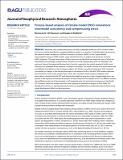Process-based analysis of climate model ENSO simulations: Intermodel consistency and compensating errors
Author(s)
Linz, Marianna; Tziperman, Eli; MacMartin, Douglas G
DownloadPublished version (650.4Kb)
Publisher Policy
Publisher Policy
Article is made available in accordance with the publisher's policy and may be subject to US copyright law. Please refer to the publisher's site for terms of use.
Terms of use
Metadata
Show full item recordAbstract
Systematic and compensating errors can lead to degraded predictive skill in climate models. Such errors may be identified by comparing different models in an analysis of individual physical processes. We examine model simulations of El Niño–Southern Oscillation (ENSO) in five Coupled Model Intercomparison Project (CMIP) models, using transfer functions to analyze nine processes critical to ENSO's dynamics. The input and output of these processes are identified and analyzed, some of which are motivated by the recharge oscillator theory. Several errors and compensating errors are identified. The east-west slope of the equatorial thermocline is found to respond to the central equatorial Pacific zonal wind stress as a damped driven harmonic oscillator in all models. This result is shown to be inconsistent with two different formulations of the recharge oscillator. East Pacific sea surface temperature (SST) responds consistently to changes in the thermocline depth in the eastern Pacific in the five CMIP models examined here. However, at time scales greater than 2 years, this consistent model response disagrees with observations, showing that the SST leads thermocline depth at long time scales. Compensating errors are present in the response of meridional transport of water away from the equator to SST: two different models show different response of the transport to off-equatorial wind curl and wind curl response to East Pacific SST. However, these two models show the same response of meridional transport to East Pacific SST. Identification of errors in specific physical processes can hopefully lead to model improvement by focusing model development efforts on these processes.
Date issued
2014-06-27Department
Massachusetts Institute of Technology. Department of Earth, Atmospheric, and Planetary SciencesJournal
Journal of Geophysical Research: Atmospheres
Publisher
American Geophysical Union
Citation
Linz, M., E. Tziperman, and D. MacMartin. "Process-Based Analysis of Climate Model Enso Simulations: Intermodel Consistency and Compensating Errors." Journal of Geophysical Research D: Atmospheres 119 12 (2014): 7396-409.
Version: Final published version